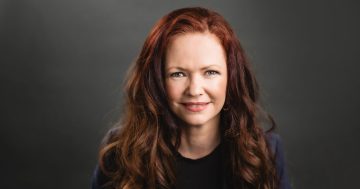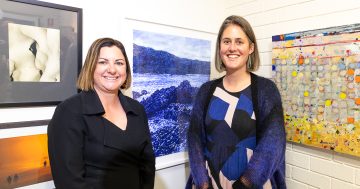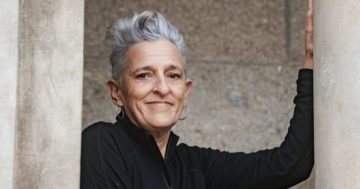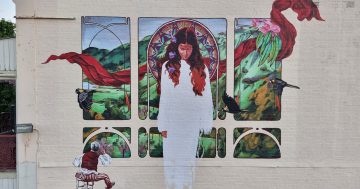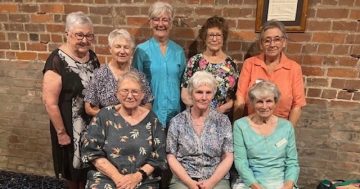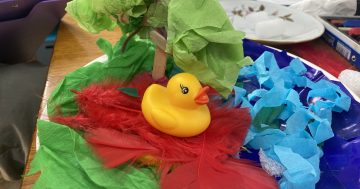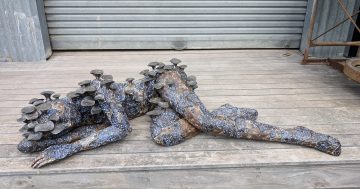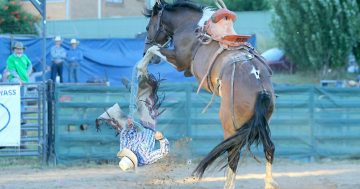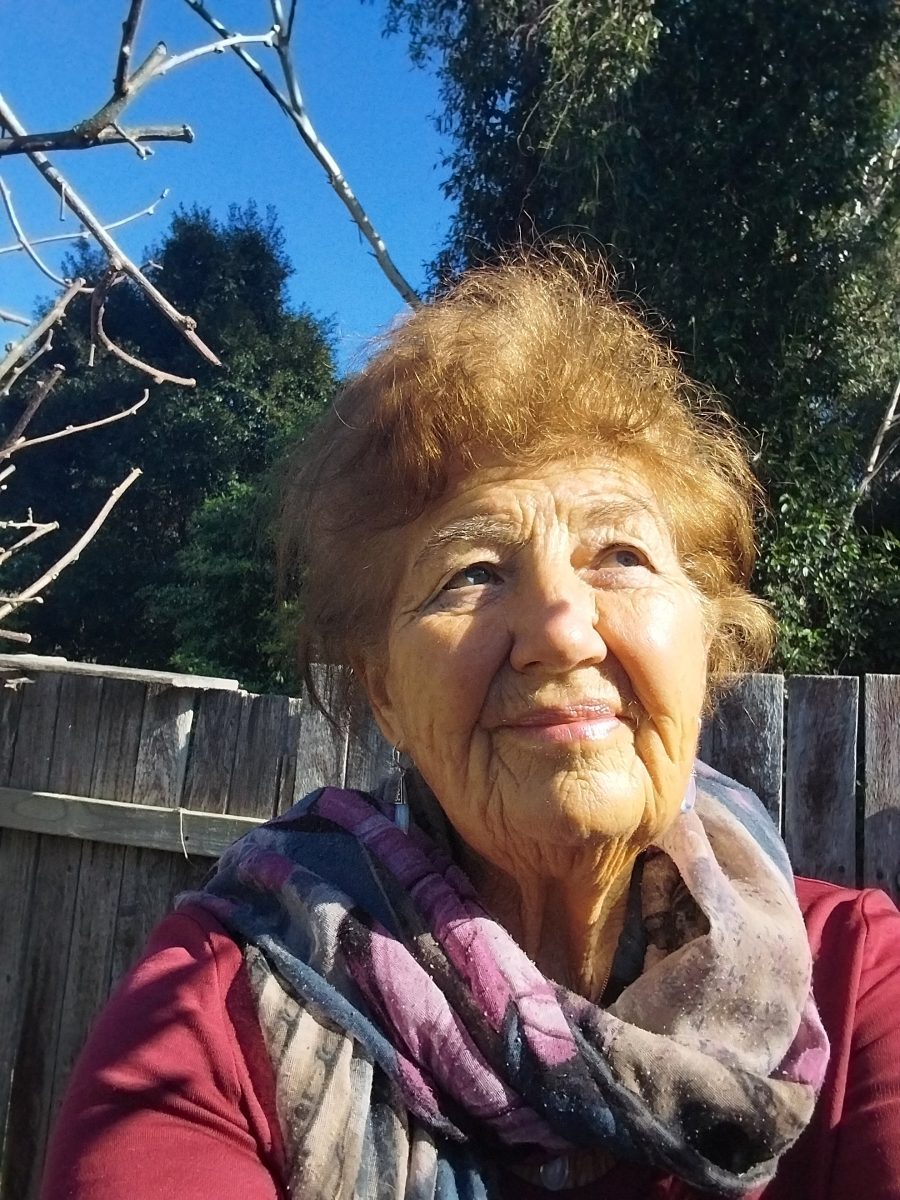
Heather Powell is looking ahead to her 80th birthday. Photo: Heather Powell.
Batemans Bay creative powerhouse Heather Powell is about to turn 80, not that you’d know from speaking to her.
“I can’t quite believe it myself,” she said. “I think the calendar is very tyrannical.”
A happy childhood in Ireland with “wonderful, mad” parents who didn’t take themselves – or their kids – too seriously gave her an optimistic outlook on life.
It also gave her a willingness to make mistakes that has served her well in her adventures across three continents.
After finishing her training as an art teacher, Heather moved to Zimbabwe, where her brother was working.
“I ended up working with what I called my naughty girls,” she said.
“They were wards of the court, had been taking drugs and absented from school. We had great fun together.”
Her relationships with the girls went well, but administration wasn’t one of Heather’s natural strengths.
“I ordered a tonne of soap by mistake once,” she said.
“I don’t know how it happened, but a trailer full of soap arrived.
“I told them they’d just have to take it back, but they were lovely about it.
“I’ve always worked with people who have a sense of fun. I suppose they’re the only ones who could tolerate me!”
She went on to work at a healing centre for injured soldiers in the mountains, run by a “very unorthodox character”.
Later, after her first husband died, she returned to England with her teenage stepson, who wanted to study drama.
Heather continued her work with the disabled, where she met her second husband, Richard, who had been working in Canberra.
“He was 20 years older than me and had been diagnosed with motor neurone disease (MND),” Heather said.
“They’d given him just three years to live, and I couldn’t take the English weather anymore, so we went back to Australia.
“And he ended up lasting 30 years!”
It was while they were on holiday in Batemans Bay that Heather first connected with the Bay Theatre Players.
The owner of the motel they were staying in, Carolyn Carver, was in a performance and invited Heather and Richard along.
Heather had a lifelong love of acting and the theatre, and was impressed by the quality coming out of the small town.
But she soon learned the Players were beset by a thorny challenge.
Their theatre on Orient Point headland had previously been leased from the Eurobodalla Shire Council, but the crumbling cliffs outside made for a safety nightmare, and the then-NSW Department of Lands wanted to develop the site for nature tourism.
A huge chunk of earnings from each performance was taken up in copyright fees, so putting on more plays didn’t seem like it would net them much additional revenue for a new home.
“The long and the short of it was they were going to have nowhere to do their plays,” Heather said.
“I’m a bit lazy and wanted to do a play with kids, but they couldn’t go backstage, because they might fall over the cliff.
“I thought rather than find a play with kids on stage all the time, it would be much easier to write one.
“And it would really cut down on copyright expenses, so I wrote Forest Fantasy and we did it.
“The next year, I wrote Rainbows are Real. I was very new age and alternative, a bit mad, you know, and always interested in the chakras.
“So I wrote it and again we didn’t have to pay copyright, it was fun, and the kids were on stage the whole time, so it saved people backstage from having to control all these excited little devils running around.”
Between the success of the plays and many other creative fundraisers, the players managed to save the money to purchase a hall at 33 Gregory Street, Batemans Bay.
Along with playwriting, directing and acting, Heather channelled her creative talents into writing two books and a booklet about her experiences: one about how the Bay Theatre Players found their new home, another about her experiences working with wounded soldiers in Zimbabwe, and another about every mistake she’s ever made.
“When I came to Australia, everybody took themselves so seriously, that’s why I wrote all the mistakes I’ve made in my life,” she said.
“I find them funny. I had wonderful parents with the most outrageous sense of the ridiculous and was taught by example not to take yourself too seriously.
“I just can’t see why people get so upset about things and I suppose that’s why I’m still alive and happy.”
She and her husband, Richard, also shared a passion for painting.
Despite the loss of his central vision caused by MND, Richard continued to paint until a year before his death.
“He was furious about his loss of vision and poured that into his paintings,” Heather said.
“He was in the garage all the time and painted these massive bloody things in oils. They were terrific.”
Heather is still active creatively, and will hold workshops and an exhibition as part of this year’s River of Art.
Her enthusiasm is making art affordable and accessible, although she’s adamant that she’s not an artist, nor an author.
“I don’t believe in any of those capital-A Artist or Author titles,” she said.
“You’re just somebody and you’re doing things that you like. I’ve got this thing about art being elitist and expensive.
“A lot of people these days are doing sketching and painting and things and they’re jolly good, but framing them is expensive, so as part of the exhibition, I’m showing how good pictures can look mounted on cardboard.
“I call them UFAs, unframed artworks.
“I’ve got rather heretical, but life is a bit more ephemeral these days and art should be one of those things you enjoy for a couple of years – and then you can throw it out.”
Heretical or not, Heather has an enjoyment of life that many would envy.
She says it comes in part from her upbringing and in part from her experiences.
“I’ve had a very fortunate life. I’ve always known I’d have enough, I’ve always been supported by family or friends,” she said.
“Living in Africa was amazing, and I was brought up in a family that laughed an awful lot.
“And because I’m into alternative stuff, I’m not scared of death. I’m not callous or indifferent about it, and I might be wrong but I don’t care, I can’t be bothered being unhappy about it.”
Her advice for anyone after a little more joy in their lives?
“Be aware of your passion, and don’t desert it. Take your work seriously, but don’t take yourself too seriously, and for God’s sake have a good laugh.
“Shakespeare said, ‘Nothing’s good or bad but thinking makes it so’.
“If you’ve got this life for the moment, you can enjoy it or you can be miserable – but that’s just my perspective because that’s all I can speak from.”







